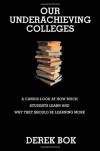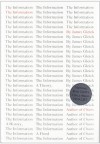Currently reading
McGlue
Knife Fight and Other Struggles
Far from the Tree: Parents, Children, and the Search for Identity
The Good Lord Bird
Ancillary Justice
Our Underachieving Colleges: A Candid Look at How Much Students Learn and Why They Should Be Learning More (New Edition)
Dissident Gardens
Nightmare Movies: Horror on Screen Since the 1960s
The Information: A History, a Theory, a Flood
Complete Novels
 250 pages, and I grit my teeth every time I pick the thing up, so never mind. I should have trusted my spidey sense, which tingled when three of the blurbs on the book came from Stephen Fry, Hugh Laurie, and Emma Thompson. Now, I've nothing against any of these very talented people. Hell, Laurie's blurb is pretty damn funny. (He says the novel is so real, Alex Dryden is likely to come right out of the pages and punch you in the stomach. Very funny. Makes little sense, which reminds me--) These particular raves, for a spy/conspiracy thriller about the "new" Russia's embeddedness in global fiscal chicanery, seemed like the strangest sort of non sequitur, like having a monkey talk about upholstery, or Jerry Lewis about the Holocaust.
250 pages, and I grit my teeth every time I pick the thing up, so never mind. I should have trusted my spidey sense, which tingled when three of the blurbs on the book came from Stephen Fry, Hugh Laurie, and Emma Thompson. Now, I've nothing against any of these very talented people. Hell, Laurie's blurb is pretty damn funny. (He says the novel is so real, Alex Dryden is likely to come right out of the pages and punch you in the stomach. Very funny. Makes little sense, which reminds me--) These particular raves, for a spy/conspiracy thriller about the "new" Russia's embeddedness in global fiscal chicanery, seemed like the strangest sort of non sequitur, like having a monkey talk about upholstery, or Jerry Lewis about the Holocaust. Still, I'm a longtime sucker for even the looniest of thrillers, if done with some panache.
But no go. Dryden's novel is narrated by Russian spy Anna, except when she's reading Finn's notes--to her? as well as just a journal? it's a bit unclear--and his voice takes over the narrative, except when it seems like there's a third external narrative voice, which is neither of them. This may be part of the precise structural mechanics of the thrilling conspiracy, if I'd only read just a bit further, but halfway in it still aggravates even if not simply half-competent.
I could go on. Anna's voice is full of inner turmoil and melodramatic exclamations of a sort that would have made Dickens snort irritably and make the universal sign for jacking off.
There are many one-sentence paragraphs.
The kind meant to build suspense, or underline a point.
Like journalists use.
Meh. I'm being pissy. You may very well enjoy this. I didn't, and I should quit complaining and move on to another book. And shall.
(But, in my humble opinion, you'd be far better served reading any of Martin Cruz Smith's excellent Arkady Renko novels, or--if you're hankering for some Evil-Empire conspiratorial nostalgia--the quite fine Archangel by Robert Harris.)
 1
1












